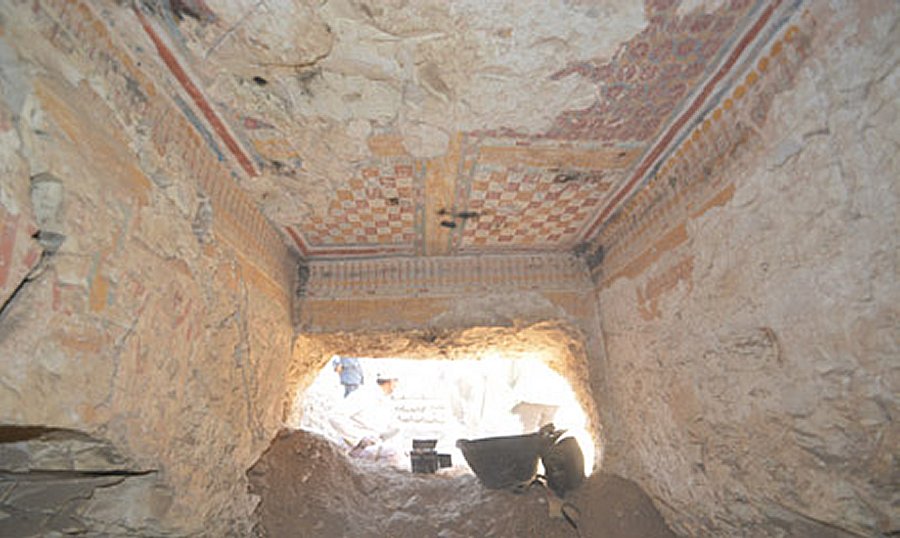3,000-Year-Old Tomb Of Royal Scribe Khonsu Unearthed In Theban Necropolis, Luxor
A private tomb in the Theban necropolis in Luxor, has been unearthed by Japanese researchers from Waseda University.
Based on its style, the beautifully decorated tomb probably dates to the Ramesside period (1292–1069 BC). It is believed that it belonged to a royal scribe named Khonsu.

The tomb was discovered while excavators were cleaning the area to the east of the forecourt of the tomb of Userhat, a high official under king Amenhotep III, Jiro Kondo, the head of the Japanese mission, told Ahram Online.
The tomb is built on a T-shape on an east-west axis, with the main entrance, currently covered in debris, facing the east. It measures approximately 4.6m in length from the entrance to the rear wall of the inner chamber, while the transverse hall measures approximately 5.5 m in width.
On the north wall of the entrance doorway, there is a scene depicting the solar boat of the god Ra-Atum being worshipped by four baboons in a pose of adoration. On the adjacent wall, hieroglyphic texts are inscribed vertically describing Khonsu as a “true renowned scribe.”
Another section of the wall has depictions of Khonsu and his wife worship the gods Osiris and Isis in a kiosk, behind which is a depiction of the two ram-headed deities, likely Khnum or Khnum-Re.
On the upper register of the northern part of the tomb, there are carved seated figures of Osiris and Isis, though the upper parts of their bodies are broken. On the lower register, a portion of the paintings shows the followers of the tomb owners.
Researchers have identified the name and title of tomb’s owner and the frieze pattern near the ceiling shows a typical khekher-frize of the Ramesside period.
The wall paintings are not well-preserved but several other decorations may be recognizable later, once the debris is removed.



 Creators of mankind
Creators of mankind Description of “Tall white aliens”
Description of “Tall white aliens” Where they came from?
Where they came from? About hostile civilizations
About hostile civilizations The war for the Earth
The war for the Earth “Tall white aliens” about eternal life
“Tall white aliens” about eternal life Video: “Nordic aliens”
Video: “Nordic aliens” Aliens
Aliens Alien encounters
Alien encounters The aliens base
The aliens base UFO
UFO Technology UFO
Technology UFO Underground civilization
Underground civilization Ancient alien artifacts
Ancient alien artifacts Military and UFO
Military and UFO Mysteries and hypotheses
Mysteries and hypotheses Scientific facts
Scientific facts


















